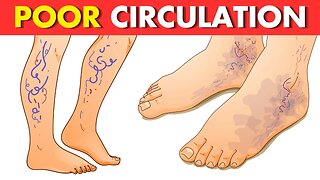Premium Only Content

5 Foods That Could Secretly Be Giving You Body Odor
We tend to associate body odor with a lack of hygiene or excessive sweating. But there are actually several other factors that can contribute to an unpleasant bodily smell.
This awkward condition may also be associated with health problems like diabetes, liver problems or even your eating habits. In today’s video we’re going to show you a few foods that can contribute to your body odor:
Garlic
Legends say that garlic can scare away vampires, and that’s because it can actually scare off humans. Sulfur has a terrible smell that manifests itself through our sweat after it’s been digested. Bell peppers, radishes, onions, and cabbages are other foods that are rich in sulfur. All of these foods have health benefits, but you have to limit their intake if you want to avoid bad odors.
Milk products
Cheese is very hard to digest, and can end up altering your body odor. Furthermore, cow and goat’s milk, due to their slower digestion, causes fermentation progress that may make you sweat more than usual. It's the perfect combination for body odor.
Tomatoes
If you observe the tomato closely, you'll see that it almost smells like sweat. This is due to some compounds called terpenes that can, in fact, alter your body odor, making it worse.
Red meat
Just like milk, red meat is digested slowly in our stomach, and our intestines have a hard time absorbing it. So, when it begins to decompose, it can negatively affect both your flatulence and your bowel movements. If you're opposed to the idea of not eating red meat, then you should at least reduce your intake to a maximum of twice a week.
Fish
Eating fish can also cause bad body odor. Trimethylamine oxide, the compound that gives fish their smell, is released through our breath and sweat, altering the smell of both.
----------------------------------------
Facebook: https://bit.ly/38BWbw3
Pinterest: https://bit.ly/2Irvwa6
Disclaimer: The materials and the information contained on Natural Cures channel are provided for general and educational purposes only and do not constitute any legal, medical or other professional advice on any subject matter. These statements have not been evaluated by the FDA and are not intended to diagnose, treat or cure any disease. Always seek the advice of your physician or other qualified health provider prior to starting any new diet or treatment and with any questions you may have regarding a medical condition. If you have or suspect that you have a medical problem, promptly contact your health care provider.
-
 4:50
4:50
Natural Cures
1 year ago $1.32 earned5 Warning Signs of Poor Circulation and How to Fix It
4.29K3 -
 1:36:05
1:36:05
Side Scrollers Podcast
19 hours agoStreamer ATTACKS Men Then Cries Victim + Pronoun Rant Anniversary + More | Side Scrollers
75K4 -
 LIVE
LIVE
Lofi Girl
2 years agoSynthwave Radio 🌌 - beats to chill/game to
251 watching -
 42:55
42:55
Stephen Gardner
1 day ago🔥Trump’s SURPRISE Move STUNS Everyone - Democrats PANIC!
102K122 -
 1:37:19
1:37:19
Badlands Media
16 hours agoBaseless Conspiracies Ep. 148: The Delphi Murders – Secrets, Setups, and Cover-Ups
47.1K17 -
 5:59:05
5:59:05
SpartakusLIVE
10 hours ago#1 MACHINE Never Stops The GRIND || LAST Stream UNTIL Friday
152K2 -
 28:36
28:36
Afshin Rattansi's Going Underground
1 day agoDoug Bandow: ENORMOUS DAMAGE Done to US’ Reputation Over Gaza, Trump ‘Easily Manipulated’ by Israel
33.4K31 -
 2:45:13
2:45:13
Barry Cunningham
16 hours agoCBS CAUGHT AGAIN! CHICAGO A MESS! LISA COOK IS COOKED AND MORE LABOR DAY NEWS!
122K51 -
 6:39:17
6:39:17
StevieTLIVE
10 hours agoMASSIVE Warzone Wins on Labor Day w/ Spartakus
37.9K1 -
 10:46:42
10:46:42
Rallied
17 hours ago $18.27 earnedWarzone Challenges w/ Doc & Bob
204K4